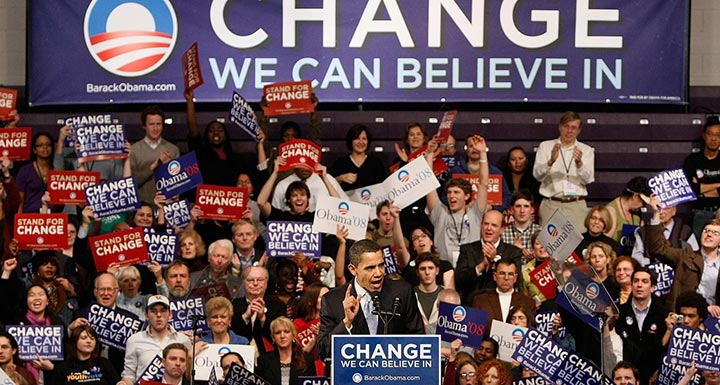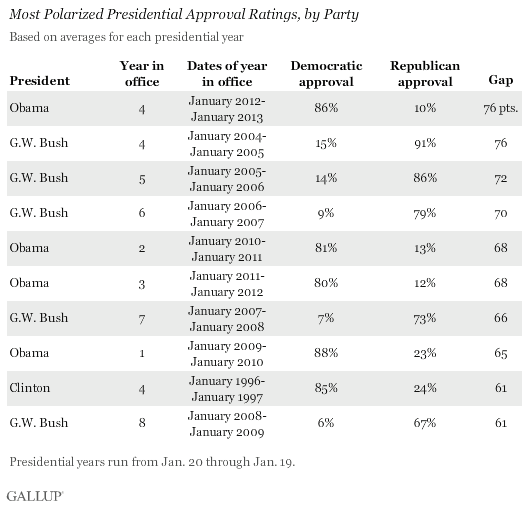
The irony of Barack Obama’s 2014, in one sentence
2014 was the year that Barack Obama saved his presidency by completely abandoning the theory of his 2008 campaign. It was the year that he accepted that the only way to bring the policy changes he had promised was to abandon the political ideals that first got him elected.
In a Rolling Stone article from August, Reid Cherlin, a former White House press staffer, nailedthe irony of the Obama administration’s record:
[T]hey have managed over six years to accomplish much of what Obama promised to do, even if accomplishing it helped speed the process of partisan breakdown.
The 2008 Democratic primary was, as Mark Schmitt wrote, a “theory of change” primary. The different candidates didn’t disagree all that much about what to do. They disagreed about how to get it done.
Hillary Clinton’s argument was that she best understood the conflictual nature of American politics: she had fought these battles before and so she was best positioned to win them in the future. Change would come through mastery of the old politics.
Obama’s argument was just the opposite: the conflictual nature of politics, he said, was the product of the people who knew no politics other than conflict. He would win the battle by ending it. Change would come through creating a new politics. Recall the famous “Yes, We Can” speech on the night Obama lost the New Hampshire Democratic primary:
Democrats, independents and Republicans who are tired of the division and distraction that has clouded Washington, who know that we can disagree without being disagreeable, who understand that, if we mobilize our voices to challenge the money and influence that stood in our way and challenge ourselves to reach for something better, there is no problem we cannot solve, there is no destiny that we cannot fulfill.
Our new American majority can end the outrage of unaffordable, unavailable health care in our time. We can bring doctors and patients, workers and businesses, Democrats and Republicans together, and we can tell the drug and insurance industry that, while they get a seat at the table, they don’t get to buy every chair, not this time, not now.
It’s all right there: Obama would do what so many past presidents had failed to do — pass health reform — and he would do it by ending the partisan divisions and moneyed interests that had broken American politics.
He was half-right.
Obama pushed more change through the political system than any serious observer expected: he passed health-care reform, as well as the largest stimulus and investment package in American history, and the Dodd-Frank financial reforms (which are working betterthan most realize). He brought the Iraq war to a close, and he actually did find and kill Osama bin Laden. There’s much left on his to-do list, but even in places where he’s failed to pass his legislative remedies into law — like immigration reform and climate change — he’s used or is using executive actions to make huge strides.
But he didn’t do all this by fixing American politics. He did all this by breaking American politics even further. Obama hasn’t healed the divisions between Democrats and Republicans. Rather, he’s one of the most polarizing presidents since the advent of polling:

There isn’t much Obama could have done about this. Party polarization is bigger than any one president. When the Senate Minority Leader says publicly, as Mitch McConnell did, that “the single most important thing we want to achieve is for President Obama to be a one-term president,” then it’s a safe bet that legislative cooperation isn’t forthcoming.
One of the more important pivots in the Obama presidency was the administration’s recognition of that fact — and its eventual abandonment of the idea that real bipartisanship was possible on divisive issues. The health-reform bill is a good example: it passed in one of the most partisan processes in memory. But it passed. Change came from accepting the reality of modern politics.
But 2014’s executive action on immigration saw the White House go a step further. In a move that normally calm Republican commentators decried as “a leap into the antidemocratic dark,” Obama ignored the will of congressional Republicans, and, refusing to be cowed by the Democrats’ defeat in the 2014 election, used a massive executive action to lift the threat of deportation from millions of unauthorized immigrants.
This is pretty close to the opposite of the way Obama promised to change politics in 2008 — it’s harshly partisan, and it’s an expansion of executive power. It’s the kind of thing that liberals would have freaked out about if President George W. Bush had done it. But, ultimately, the Obama administration decided that if they could only pick one, they preferred delivering on their policy promises to hewing to the spirit of their political ideals.
The same has been true when it comes to the power of special interests in Washington. The health-reform bill got done by cutting side deals with pharmaceutical companies and insurers. Dodd-Frank isn’t beloved by banks, but it could have gone a lot further. The Obama administration has put virtually no political capital behind major campaign-finance reforms or other ideas that would fundamentally change how Washington works.
Obama has brought a lot of change to America. But he’s done it by accepting — and, in many cases, accelerating — the breakdown of American politics.
(From the: Vox)

